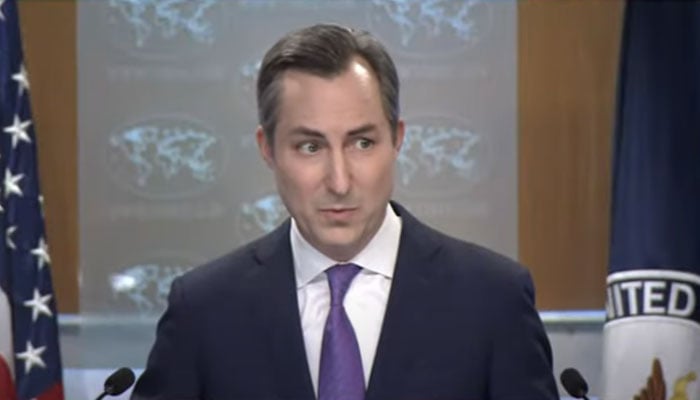
- State Department spox urges govt to handle protests peacefully.
- Says US regularly raises Sikh killing issue with Indian officials.
- Spox avoids answering question regarding President-elect Trump.
The United States has reaffirmed its commitment to supporting Pakistan in its efforts against terrorism and extremism.
“We continue to stand with Pakistan in its fight against terrorism and violent extremism,” Matthew Miller, spokesperson for the US State Department, said while addressing a weekly media briefing in Washington on Monday.
Responding to a question regarding deaths during a protest of the Pakistan Tehreek-e-Insaf (PTI) in Pakistan, Miller highlighted the importance of holding peaceful demonstrations globally, including in Pakistan.
He remarked that protests around the world, including in Pakistan, should remain peaceful, calling on the Pakistani government to engage and deal with protesters peacefully.
During the protest demonstration which was launched by the former ruling party on November 24, at least three Rangers personnel and two cops were martyred in violent clashes.
The Imran Khan-led party also claims that the lives of at least 20 members were also lost during the crackdown by the security forces.
Law enforcers arrested more than 1,000 PTI workers, including over three dozen Afghan nationals.
Answering a question, the State Department’s spokesperson said the US officials regularly raised the issue of the alleged conspiracy to assassinate a Sikh leader in conversations with their Indian counterparts.
Replying to a question regarding President-elect Donald Trump’s remarks about threatening allied nations, the spokesperson refrained from commenting saying: “I don’t think it’s appropriate for me to comment on the policies of an administration that has not yet taken office.”
“We have one president of the time and I’m glad to stand up here and take questions about President Biden’s foreign policy and presumably a new State Department spokesperson on January 21 who can take questions about President Trump’s foreign policy.”



